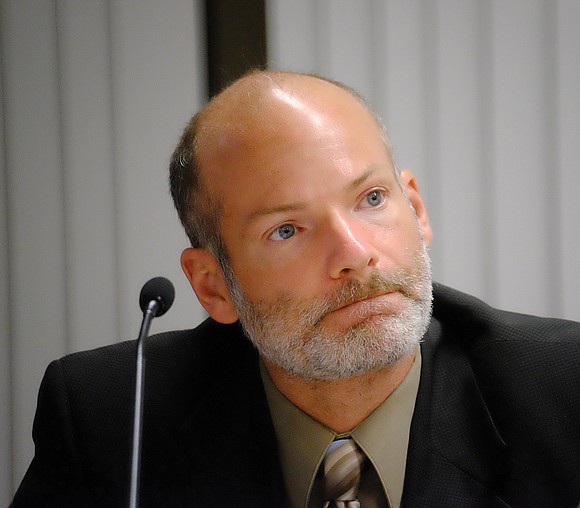Wrinkle in process means RPS doesn’t have access to city-managed school construction money
Jeremy M. Lazarus | 10/14/2021, 6 p.m.
Richmond Public Schools has hit an unexpected roadblock on its way to hiring an architectural team to design a replacement for decaying George Wythe High School.
Before RPS can spend any of the estimated $10.3 million now available to cover architectural fees for new school buildings, the school system first must get approval from City Council to gain access to the money.
No one on the school side, including RPS’ legal counsel, appeared to be aware of the requirement for the council to approve an ordinance to make that happen.
The first inkling came when Mayor Levar M. Stoney quietly gave a heads up to RPS Superintendent Jason Kam- ras two weeks ago.
Mayor Stoney had Eva Colen, his senior policy adviser, deliver the message to Mr. Kamras after Finance Director Sheila White blocked release of the money without approval from the city’s governing body.
Awareness of the problem, and the knowledge that it must be dealt with, come as the School Board and the Kamras administration are making preparations to issue a contract for design services.
Final submissions from firms competing for the contract are due Friday, Oct. 15. The Kamras administration is setting up an evaluation panel to review the submissions and make a recommendation. The School Board is anticipating awarding the contract before Thanksgiving.
Until the mayor clued them in, both the School Board and the Kamras administration assumed the design funding was under their control. That includes $7.3 million remaining from a larger pool of money that the council approved for school design work at least five years ago, plus $3.3 million has been added since. According to the Stoney administration, the design money is held in a city fund “for the purpose of new school modernization.” However, it was never appropriated to the school system “owing to the fact that the city has managed procurement and construction management processes for new school construction” for more than a decade, Jim Nolan, Mayor Stoney’s press secretary, noted in a statement.
He stated that RPS could not gain access to the money “unless and until City Council re-appropriates funds” from the school modernization account to the school system.
The School Board reasserted its control over school building development last spring, but neither the board nor anyone from RPS requested City Council action to free up the design money or any funding for school construction.
The Free Press has been told that RPS’ counsel, Jonnell P. Lilly of the Harrell & Chambliss law firm, did not advise the School Board about the need for such a council ordinance. Ms. Lilly and the firm have not responded to a Free Press request for comment.
RPS expects to use less than half of the money in the fund for current design needs.
The school system planned to use some of the funds to hire a firm to draw up plans and oversee construction of a replacement George Wythe. RPS officials also planned to use another share of the money to pay for the design of a new Woodville Elementary School.
The school system is planning to issue a request for proposals for the new school in Church Hill by the end of October.
School Board Vice Chair Jonathan Young, 4th District, remains confident that this latest snafu will be resolved relatively quickly.
He does not expect the majority of the council to balk at providing access to the money.
“I take everyone at their word when they convey their expectation to open a new George Wythe for the 2024-25 school year,” he said.
Members of City Council who spoke with the Free Press said they were unaware of the legal wrinkle and assumed the school system already had direct access to the design money. They were not opposed to the transfer of the funds.
Mr. Young said that talks have begun with City Council members about expediting the needed ordinance. While that is being accomplished, he said he believes the school system could find the rela- tively small amount of money that an architectural firm would initially need to start work.
“We won’t need the whole pot of money right away,” Mr. Young said. “We just need enough to cover initial costs, possibly as little as $100,000.”







